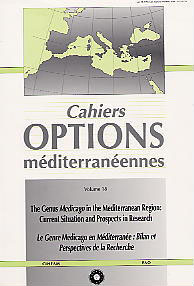| Article précédent | p. 171-175 | Article suivant |
Medicago truncatula: a legume model-plant
As most of the legumes, plants belonging to the genus Medicago have the ability to associate with soil bacteria (essentially of the genus Rhizobium), an important 'plant/soil microorganisms' interaction with regard to forage productivity and reduced fertilizer inputs facilities. Due to its high genetic complexity, the cultivated alfalfa (M. sativa L.) does not suit to the genetic studies which are required to understand the mechanisms underlying this symbiosis. The model-plant species actually used to develop such studies is the annual, diploid and autogamous species M. truncatula. It is shown how, thank to its genetic, biotechnologic as well as agronomic potential, this species can be used for multidisciplinary approaches (biodiversity, plant-microbe interaction analyses, gene expression, mutagenesis, genetic mapping, agronomic improvement).
- [ Afficher ]
- [ Télécharger ]
- [ Exporter la citation ]
Vous pouvez télécharger la citation au format :
- [ Imprimer ]
-
Mots-clés
CARTE GENETIQUE, MARQUEUR GENETIQUE, MEDICAGO, SYMBIOSE, VARIATION GENETIQUECiter cet article
Huguet T., Prosperi J.M. Medicago truncatula: a legume model-plant. In : Genier G. (ed.), Prosperi J.M. (ed.). The Genus Medicago in the Mediterranean region: Current situation and prospects in research . Zaragoza : CIHEAM, 1996. p. 171-175. (Cahiers Options Méditerranéennes; n. 18). Meeting of the Mediterranean Working Group on Medicago of the FAO/CIHEAM Inter-Regional Research and Development Network on Pastures and Fodder Crops, 1995/10/19-22, Hammamet (Tunisia). http://om.ciheam.org/om/pdf/c18/96605772.pdf



